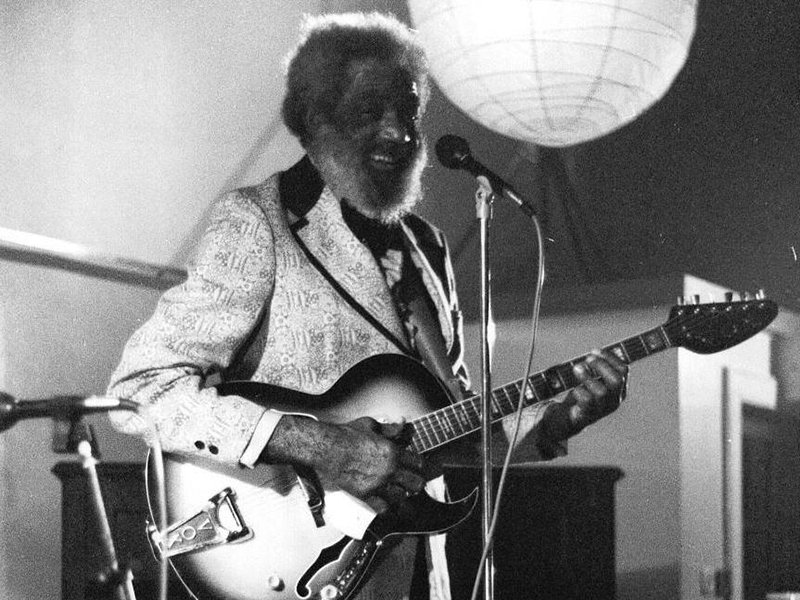Jews have been involved in the growth and development of almost every mainstream musical genre. Direct references to Jewish themes and culture, however, have mostly been reserved for Jewish and Israeli music. Then again, there is that little jazz ditty about bagels.
If you’ve never heard it, that’s understandable, as it’s gradually been forgotten with the passage of time.
I was reminded of this catchy song and its associated musical act in January, when Dust-to-Digital, a company that releases rare or historical recordings of jazz, blues, gospel and country music, wished a happy birthday to Bulee (Slim) Gaillard.
The late jazz musician played four instruments, recorded many albums, was known for his comedic riffs and colourful dialect, and worked with legends like Charlie Parker, Fats Waller and Dizzy Gillespie. Gaillard also made cameos in movies (Hellzapoppin’, Planet of the Apes) and TV shows (Marcus Welby, M.D., Mission Impossible). Yet, it was Gaillard’s background and connection to Judaism that continues to leave some musical historians baffled.
He claimed to have been born in Santa Clara, Cuba, in 1911, although he may actually have come from Detroit, Pensacola, Fla., or Claiborne, Ala. He also claimed to have an Afro-Cuban mother, Mary (or Maria) Gaillard, and a Jewish-German father, Theophilus Rothschild, who worked as a ship’s steward.
As the story goes, the 12-year-old Gaillard went with his father on a voyage and was accidentally left behind on the Greek island of Crete. “I stayed there for four years,” he said during a 1989 TV documentary. “I travelled on the boats to Beirut and Syria and I learned to speak the language and the people’s way of life.”
Gaillard eventually returned to the U.S., although his original intention was to live in Cuba. He never reunited with his parents, but some of their heritage (real or imaginary) found its way into his music.
Two of his original compositions, Dunkin’ Bagels and Matzo Balls, specifically referred to Jewish cuisine and included a few sprinklings of Yiddish. They were both recorded in 1945 by the Slim Gaillard Quartet, and audio can be found on YouTube and various music streaming services.
Dust-to-Digital, for its part, linked to a performance of Dunkin’ Bagels featuring Gaillard, bassist Bam Brown and drummer Scatman Crothers from the short film, O’Voutie O’Rooney (1947). The text card that pops up claims the song (listed as Dunkin’ Bagel) will prove that “ ‘Ovoutee Slanguage’ is absolutely kosher.”
Black jazz musicians playing an upbeat song with references to gefilte fish and pickled herring, along with the memorable lyrics, “Dunkin’ bagels, dunkin’ bagels, dunkin’ bagels, splash in the coffee,” is really a sight to see.
Matzo Balls is equally amusing in its own right. Here are a few lines: “Ah, well, ah matzah
balls/Gefilte fish/Best old dish I ever, ever had/Now matzah balls/And gefilte fish/Makes you order up an extra dish.”
In fairness, Gaillard wasn’t the only black musician doing this. Charles B. Hersch’s book, Jews and Jazz: Improvising Ethnicity (2016) correctly pointed out that Cab Calloway occasionally incorporated Judaism into his music. “Gaillard and Calloway engaged with Jewish music in three ways,” he wrote, “singing Jewish songs, evoking Jewishness through musical devices and singing lyrics with Jewish themes.”
What makes Gaillard’s specific compositions unique was his ability to thread Jewish themes into his music without truly focusing on them. Bagels and matzah balls, which were rarely consumed by non-Jews in the 1940s, were transformed into items that could easily appear on either a restaurant menu or kitchen table. So much so, one would almost wonder if these foods hadn’t been there the whole time.
Remember that the next time you dunk a bagel in your coffee.
